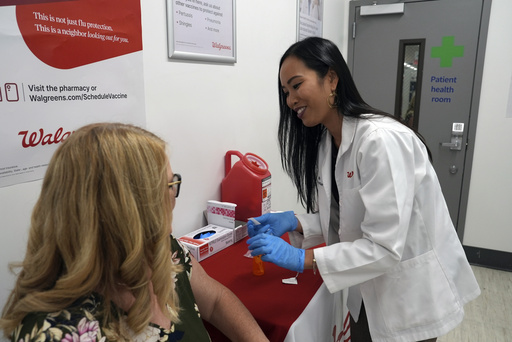
WASHINGTON — If you didn’t take advantage of the early autumn vaccination push for flu and COVID-19, there’s still time to protect yourself.
Health experts emphasize the importance of getting vaccinated before the holiday season, a time when respiratory illnesses often spread due to increased travel and indoor gatherings.
So far this fall, respiratory viruses haven’t had a significant impact. However, COVID-19 tends to see a rise in winter, typically starting around Thanksgiving and peaking in January. This season also coincides with the flu season, which usually begins in November or December, reaching its peak around January or February.
It’s important to note that it takes about two weeks for immunity to develop after receiving either vaccine, highlighting the need for vaccinations before viruses become widespread. Additionally, older adults are often advised to protect themselves against another concerning winter virus, RSV (Respiratory Syncytial Virus).
There’s good news: you can get both your flu and COVID-19 vaccines simultaneously. It’s essential to clarify that these are not merely booster shots; they’re specifically designed to combat newly emerging variants of the viruses. Influenza and COVID-19 are known for their ability to mutate, which is why both vaccines undergo annual reformulation to better match the circulating strains.
While no vaccine offers absolute protection, both the flu and COVID-19 vaccines provide substantial safeguards against severe illness or death. “Vaccinations may not prevent every infection, but they tend to lessen the severity of those infections,” explained a prominent CDC expert, who noted that he would prefer his family members to have mild symptoms than face an emergency room visit during Thanksgiving.
In the last flu season, only 45% of adults got a flu vaccination, and an even lower percentage, 23%, opted for a COVID-19 shot. “Our best safeguard for ourselves and those we care about is simply getting vaccinated,” stated an American Medical Association leader.
Despite being less prominent in the news lately, COVID-19 continues to pose a greater death toll than the flu each year. A healthcare professional advised against complacency, urging individuals to get vaccinated to lower their risk of severe illness.
Who Should Get Vaccinated?
The CDC recommends an updated COVID-19 vaccine and an annual flu shot for everyone aged six months and up. If you’ve recently recovered from COVID-19, a waiting period of two to three months is suggested before getting vaccinated, but you should still proceed to ensure protection against an expected winter surge.
Vulnerable populations, including older adults, individuals with weakened immune systems, and those with chronic heart or lung conditions, should prioritize getting vaccinated. Young children are also at a higher risk, with nearly 200 pediatric deaths due to flu last season.
Pregnant women are at an elevated risk for severe cases of both COVID-19 and flu, making vaccination crucial for protecting both them and their newborns.
For those aged 65 and older, the CDC recommends a second COVID-19 shot approximately six months after the initial fall vaccination, aimed at enhancing ongoing protection during the year. Additionally, individuals with weakened immune systems may qualify for extra doses as well.
What’s New With This Year’s COVID-19 Vaccines?
The vaccines available this fall are formulated to combat current circulating subtypes of the coronavirus family tree, differing from the formulations used last year. Pfizer and Moderna’s shots target a subtype known as KP.2, while Novavax’s vaccine focuses on a related strain called JN.1. Experts believe all these vaccines will provide good cross-protection against other circulating variants.
The Pfizer and Moderna mRNA vaccines are suitable for use in adults and children as young as six months, while the Novavax option—a protein-based vaccine enhanced with an immune booster—is available for individuals aged 12 and older.
Choosing a Flu Vaccine
There are specifically designed high-dose shots and vaccines with additional immune boosters for older adults; however, if those options are unavailable, a standard flu shot is still effective. A nasal spray version of the flu vaccine, known as FluMist, is available for individuals aged two to 49 at various pharmacies and clinics, with plans for it to be accessible for home use next year.
This year’s flu vaccinations protect against two Type A flu strains and one Type B strain, as the vaccine has evolved to remove outdated strains no longer in circulation.
Understanding RSV
Respiratory syncytial virus (RSV) is generally mild for most but can cause significant hospitalizations and be life-threatening for young children, the elderly, and individuals with specific health conditions. The CDC advocates for RSV vaccinations in people aged 75 and older, and in those aged 60 to 74 who possess elevated health risks. The RSV vaccination is a one-time shot rather than an annual requirement, yet only about a quarter of eligible seniors received it last year. Additionally, late-stage pregnancy vaccination is recommended to safeguard newborns during flu season.
Although light side effects like arm soreness or mild discomfort may occur, experts assert that it’s safe to receive RSV, flu, and COVID-19 vaccines simultaneously, providing comprehensive protection for individuals and their communities.
Cost of Vaccines
Vaccination costs should generally be covered by Medicare, Medicaid, and most private insurance plans if provided by in-network suppliers. Last year, around 1.5 million uninsured adults received complimentary COVID-19 vaccinations through a federal initiative that has since concluded. To enhance vaccine access, the CDC has allocated $62 million to health departments. Those interested should reach out to their local health departments for information regarding services available in their area.
Check with local pharmacies for vaccine availability.
